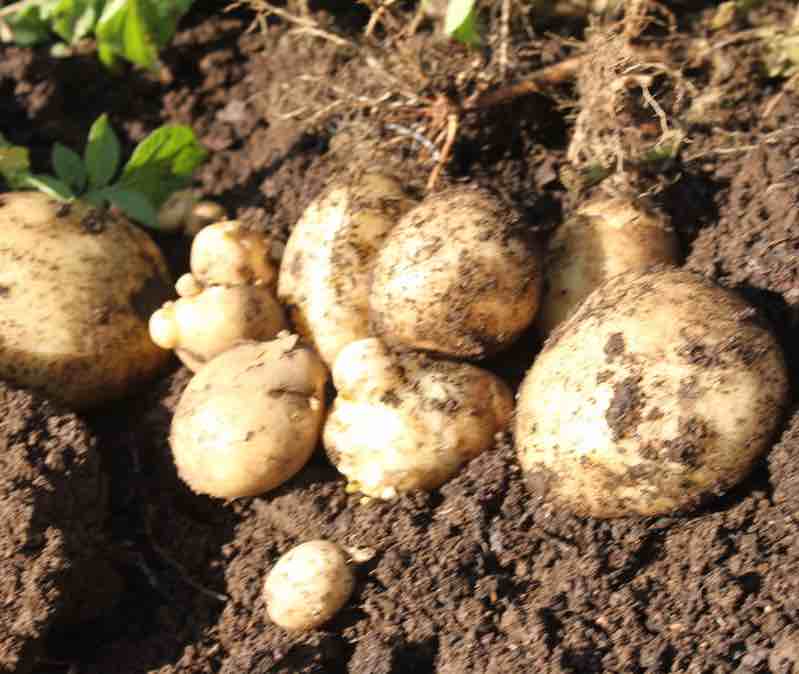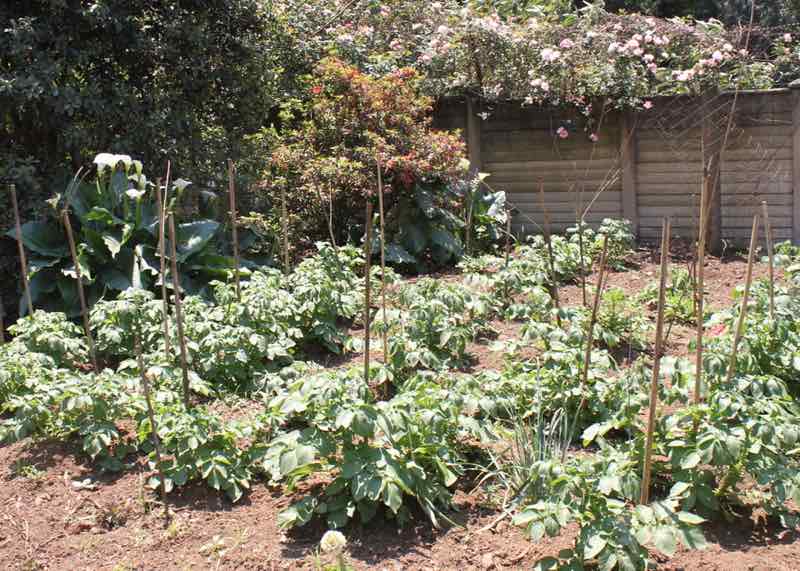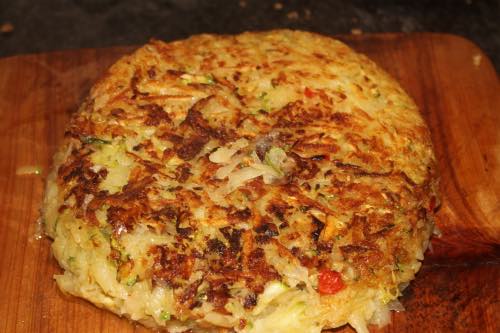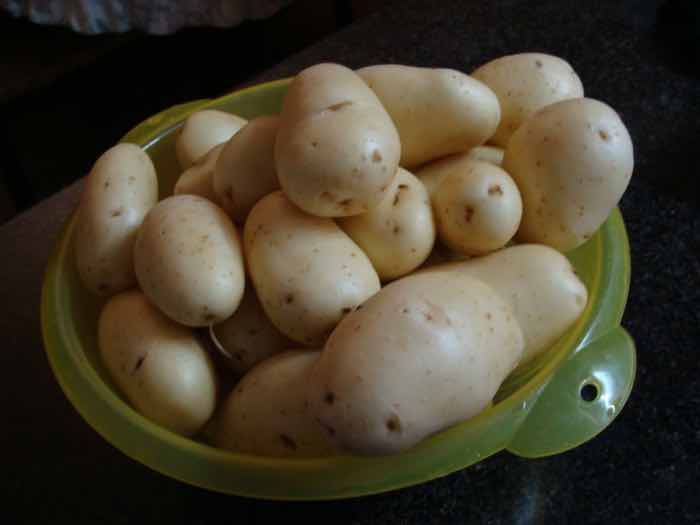What are new potatoes?
What are new potatoes? Straight from the garden they can be eaten by many diabetics. Having said that, we are all different. Some can enjoy unrefined-starches but others must avoid carbs; period.
Russets are to be avoided by all, along with any refined starches; they will cause an immediate spike in blood-glucose.
The trick for diabetics is to do a blood-prick test about sixty minutes after a meal of new potatoes; if it has not returned close to the levels before dinner then they should avoid all spuds.
Quick guide
This page was last updated on 7th November, 2025.
Your spuds are controversial if you are resistant to insulin. The problem is that there is a vast difference in the glycemic-index and load between varieties; and it depends on how you prepare them.
Boiled russets and particularly potato chips are a disaster for diabetics; and actually not good for any of us. Deep-fried in a seed oil they simply add to the inflammation.
Advanced glycation end-products
Those who have no desire to be injecting themselves with insulin in the future should avoid french-fries and potato chips.
That
extra glucose which is being let loose in the serum attaches to each red
blood cell, forming what is known as an "advanced glycation end-product;" or AGE; they are very damaging to capillaries and the great vessels. Over a half of diabetic men will suffer from impotence; 3.5 times more than controls. Nerves and the retinas of the eyes are affected too.
The joy of new potatoes is that they can be enjoyed in moderation by many diabetics; and for all those who love a spud straight from the garden they are so tasty. When you cut into them, they give off a satisfying crunchy sound quite different to those from cold-storage.
Exactly what are new potatoes?
There is evidence that some marketers cheat; in the UK and almost certainly elsewhere spuds which have been in storage for over six months are being sold as new potatoes so it's a case of buyer-beware.
A
new potato has a thin skin that can be easily scraped off with your
thumbnail; it does not keep so it should be eaten within three-days before the starch becomes highly glycemic. Most vegetables deteriorate once they have been harvested; your spuds are no different.
So you will only get them in small-packets and thus they cost more; unless you grow them yourself. Lift only enough for today and perhaps tomorrow. Bring the children into the garden with you; they simply adore hunting for the spuds as you turn the sod.
Try to avoid having two-starches at the same meal; rice and potatoes would be your undoing.
What are new potatoes?
So what are new potatoes? They have recently been lifted and certainly not come from cold-storage. Try to eat what's in season.

New potatoes along with the reds are known as waxy as they have half the glycemic-load.
Roundup And paraquat just before harvesting
There is another good reason to enjoy new potatoes; they are not sprayed with a herbicide like Glyphosate, marketed as Roundup just days before harvesting to desiccate the plant. Scientists have changed the grading from "possibly" to "probably" causing tumours; residues are found in many of the commercial foods we eat.
"The tiny US state of Vermont just voted overwhelmingly to ban bee-killing neonicotinoids in a move that could upend the entire pesticides industry."
- Associated Press 22 March 2024
Monsanto the company that manufactures glyphosate is not happy. The European Court of Justice in March, 2019 forced them to release the studies that supposedly claim that Roundup is safe and has no detrimental effect on our well-being; up to now they have fervidly refused to allow anyone to peruse their research methods.
Now independent scientists have the opportunity to see if it is bogus lies based on falsification of the statistics; in short, fake news.
"There are three kinds; lies, damned lies and statistics."
- Benjamin Disraeli, British prime minister (1804 - 1881)
Do you ever wonder why almost every family is being touched by "the big C" or an autoimmune-disease? Our recommendation is to scrupulously avoid all the chemicals added to our food; treat the whole lot with suspicion. That puts one on the edge of orthorexia but having witnessed personally so much metastatic sickness, I have no desire for my patients to go out that way.
I would rather be labelled obsessive, a food-snob and a nut.
Paraquat
Remember new potatoes have much less starch than those that have been in cold storage for months; about a half. Many diabetics report they cause no glucose-spike at all; test yourself.
Paraquat is the most highly toxic herbicide used today[1], particularly in developing countries like South Africa. It is banned in the EU and many more states but continues to be sprayed on our food as a preharvest-desiccant; on potatoes and other crops.
It is just another reason to enjoy new-potatoes from your own garden; you can be sure that your spuds are free of very poisonous chemicals.
 Adding cheese and cream lowers the GI
Adding cheese and cream lowers the GIEven better if you allow your new potatoes to cool overnight in the fridge and then reheat them, retrogradation links the molecules of the amylose together; they pass through the small-intestine partially undigested.
Instead of being absorbed the starch reaches the colon for the microbiota that inhabit the intestine; that means less chance of getting an autoimmune-sickness like Parkinson's disease too.
Moles in your garden
If you have a problem with moles in your garden as we do, then do not plant your seed-potatoes in trenches; we have learned the hard way to set them out randomly. Otherwise, having discovered the first "chat" the little devils will devour the lot.
Actually moles do a lot of good in the garden, aerating the soil and devouring grubs; but they can damage your new potatoes too. Planting our favourite tubers in mesh-bags certainly does help to keep them at bay but it's a schlep.
How to plant potatoes will help you get started; you will notice that we used to set them in trenches but no longer.
Old potatoes make great seed; keep your chats in a paper bag in a dark place for planting in the spring.
 Grow your own potatoes
Grow your own potatoesSince there is absolutely no testing of herbicide residues in food grown in SA, we should assume that paraquat is there in our commercial potatoes. An agri-chemicals salesman just confirmed it to me.
It is just one more reason why you should develop your own green garden. Are we just becoming totally neurotic about our food? You be the judge.
What are new potatoes? You can go burrowing for them before the haulm dies back, allowing the plant to continue growing.
There are growing suspicions that many diseases like porphyria are in fact directly related to our lifestyle; what we eat, how much we exercise and how well we sleep for example.
Mulching your potatoes
Heaping up your new potatoes to keep the haulm upright is a challenge; so that the plant can keep growing, producing "chats" up the stem.
This year we had access to a large amount of mulch. It was hard work bringing it on site but gosh it has proved so worthwhile. We are anticipating half a ton of new potatoes just in a suburban garden; the value at current prices will be about R10,000.
Potatoes are getting such bad press in this obese world; and if they came from cold storage, rightly so. They then have a very high glycemic index. But have no fear of these babies; their GI is low, consisting mainly of resistant starch.
Retrogradation of starches
Remember that refrigerating any carbohydrate overnight causes the starch to retrograde; molecules link together making it more difficult for the enzymes in the small-intestine to digest them. That's so important it is worth repeating.
The net result is a smaller blood-glucose surge and only a minor need for insulin from the pancreas; and so they are also less fattening.
Instead the good bacteria in the intestines feed greedily on the residues to produce many necessary byproducts but little glucose; and gas unfortunately. Read more about this at reheating resistant starch.
What are new potatoes? They are friendly carbs even for those who are insulin-resistant, particularly if you allow for retrogradation.
"Do not eat any refined-carbs, period."
Dr Atkins
Let us state it candidly; if you want to live long in the land then avoid all processed carbohydrate and in general keep your total-starch to less than 150g per day.
Diabetics should be eating less than 50g per day; and even lower if they are unstable.
It is almost impossible to lose weight if you are obese, unless you cut your carbs below 50 grams per day. Insulin resistance turns even the healthiest of starches into enemies.
Research from Tufts University shows the average American is consuming nearly a whole cup of sugar per day, much of it hidden in sauces, soups and cereals; that alone is 171g.
A litre of the average cola contains around 150g of carb.
Taste of Home will teach you how to roast new potatoes[2].
"A healthy adult male bore consumes each year one and a half times his own weight in other people's patience."
- John Updike
To those who are passionate on a theme and to myself on the subject of new potatoes and carbs in general, I'm reminded there is no virtue in turning ourselves in bores.
Losing a significant amount of weight permanently is one of the greatest challenges of life; it's as difficult as giving up smoking. In my experience it is a spiritual issue; rarely achieved until we grasp that refined carbs can end our lives decades before our intended time on earth.
The Look AHEAD programme suggests that one cannot lose weight by a change of diet and exercise; but the research was fundamentally flawed from the start.
Day 1: Carbs in the life of a believer
Carbs in the life of a Believer shows how modern milling has taken natural grains and turned them into pseudo foods from the Devil's Pantry.
Day 2: Potatoes in the life of the believer
Part II in this series concerns the place of potatoes in the life of the believer. Gaining some understanding of the meaning of retrogradation helps in the management of obesity.
Day 3: Believers can enjoy green mealies
There is abundant scientific evidence that whole grains are extremely beneficial; they are straight from God's Pantry. But once refined much of the goodness has been extracted and they become highly glycemic; they raise our blood glucose alarmingly.
So believers can enjoy green mealies but will have difficulty finding true wholegrain maizemeal for their porridge, grits and putu.
Day 4: How much sugar in the life of a Believer?
In small amounts sugar is probably fine. There is no consensus on what is acceptable. Over 70 tsp per week is almost certainly too much; that's about one cola per day.
Day 5: What about cake flour for believers?
I know this has been a difficult series of talks for you. Such are the inroads that the Devil has made into our thinking and practice that we have not seen through his deception; refined cornmeal, sugar and now cake flour.
Potassium, new potatoes and blood pressure
One of the joys of new potatoes in their skins is that they are a very rich source of potassium. Less than 3% of those eating typical grocery store food are getting the required dietary allowance of the mineral; hypertension and stroke become the order of the day. Does that sound familiar?
Add the water used to boil potatoes to your soups, gravies and if you're a baker in the dough; your bread will rise much better creating a lighter loaf.
It is questionable whether you should do this with commercial potatoes; 30% of spuds grown in Europe contain more than the maximum residue level of toxic ecocides. Figures on the internet vary wildly; you just don't know.
How much does the potato peel weigh?
There is no need to peel new potatoes. That reduces the time to prepare them and considerable wastage of food; astonishingly as much as a third of the "fresh weight." Some authorities report even 40%.
And that skin contributes a lot of fibre to our food; only 5% of those eating typical grocery store food are getting the recommended daily allowance.
"There are between five and ten times more antioxidant compounds in the skin as in the flesh of potatoes; and a great source of fibre."
- University of Maine, Agriculture and Water Quality
New potatoes, green beans and a fat
The three basic foods are starches, protein and fats. Few meals are more delicious and nutritious than boiled new potatoes, a helping of green beans and a blob of butter; or an avocado.
Are baby potatoes the same as new spuds?
So I hope you now have a grasp of what are new potatoes; they are lifted before the haulm has completely matured. Best is when they are still quite small but really anything before the plant dies off.
Baby potatoes are to die for but keep the load down if you are overweight or diabetic.
Latkes and röstis
Generally latkes are of questionable merit; made with potatoes often from cold storage, all-purpose flour and fried in solvent extracted oils.
But this best new potato latke recipe ever is quite different; and tastes far better too.
And Swiss röstis are even easier to make; but once again they are very fattening if made from cold-storage potatoes. Flipping them is made easier with a wooden board.
 A traditional Swiss rosti in just thirty minutes
A traditional Swiss rosti in just thirty minutesWhen browsing use right click and Open Link in New Tab, or you may get a bad gateway signal.
The material expressed on this page is gleaned from the nutritional and environmental literature; it is clearly referenced. A plain distinction is made between the author's opinion and that which is scientifically proven. When in doubt consult your health professional.
To suggest a correction or clarification, write to Dr Bernard Preston here. Contact.
Newsletter
Our newsletter is entitled "create a cyan zone" at your home, preserving both yourself and Mother Earth for future generations; and the family too, of course. We promise not to spam you with daily emails promoting various products. You may get an occasional nudge to buy one of my books.
Here are the back issues.
- Lifestyle and ideal body weight
- What are ultra-processed foods?
- Investing in long-term health
- Diseases from plastic exposure
- Intensive lifestyle management for obesity has limited value
- A world largely devoid of Parkinson's Disease
- The impact of friendly bacteria in the tum on the prevention of cancer
- There's a hole in the bucket
- Everyone is talking about weight loss drugs
- Pull the sweet tooth
- If you suffer from heartburn plant a susu
- Refined maize meal and stunting
- Should agriculture and industry get priority for water and electricity?
- Nature is calling
- Mill your own flour
- Bake your own sourdough bread
- Microplastics from our water
- Alternative types of water storage
- Wear your clothes out
- Comfort foods
- Create a bee-friendly environment
- Go to bed slightly hungry
- Keep bees
- Blue zone folk are religious
- Reduce plastic waste
- Family is important
- What can go in compost?
- Grow broad beans for longevity
- Harvest and store sunshine
- Blue zone exercise
- Harvest and store your rainwater
- Create a cyan zone at your home
"Conventionally boiled less mature potatoes should be encouraged as part of low-GI diets."
- Glycaemic index of potatoes[3].
The longevity diet promotes moderate to high unrefined starches but potatoes are not specifically mentioned. Nevertheless we would recommend sticking with those that are smaller and recently harvested.
Did you find this page interesting? How about forwarding it to a friendly book or food junkie? Better still, a social media tick would help.
Address:
56 Groenekloof Rd,
Hilton, KZN
South Africa
Website:
https://www.bernard-preston.com
